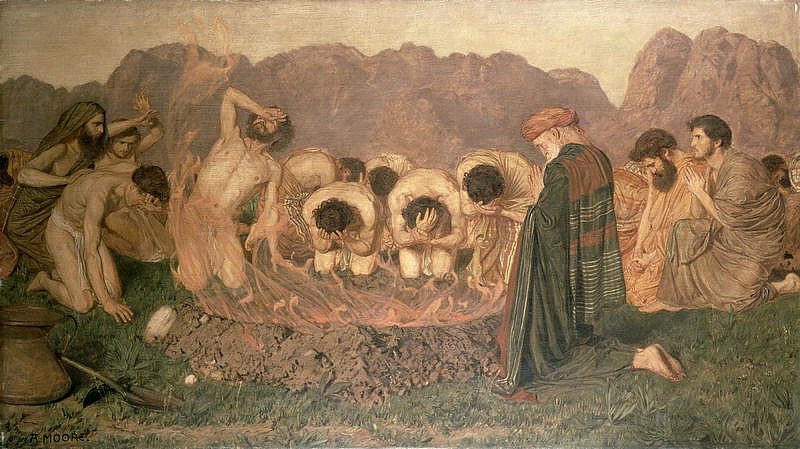Elijah was exhausted. The previous day had drained him physically, emotionally, and spiritually. During the showdown on Mount Carmel he had been fired by conviction and confidence in God’s absolute rulership.
Watching the ultimately pathetic display of Baal’s priests writhing, dancing, pleading, and eventually lacerating their bodies had worn on him, and he relieved the tedium with some taunting words. Perhaps it was ill advised, but after all, it was Elijah, one man, against 450 priests of Baal. Surely he was entitled to some sense of satisfaction.
After spending most of the day in this way, by the hour of the evening sacrifice everyone could see that Baal — if he even existed — would not, or could not answer.
Next, Elijah had invited the people to come near. He wanted them to witness the power of the God of Israel close up and personal. After building the altar according to the prescribed formula — 12 stones, one for each of the 12 tribes — he had a trench dug around the altar. After preparing the wood to burn and placing the sacrifice on it, he had them drench everything three times, until the trench filled with water.
Then he prayed that God would demonstrate His power, so that there would be no doubt who was God. When he finished praying fire came down from heaven and not only kindled the wood and burned the sacrifice, it consumed all the water, all the wood, all the flesh of the animal, and even the very stones themselves, leaving only a scorched rectangle on the ground.
The people now recognized the difference between Baal and Yahweh. Baal was supposed to be able to bring the rain, but he had failed to do so for the last 3 1/2 years. And now, in the most dramatic fashion, not only had Baal failed to bring fire down from heaven, but Yahweh had done so in an unmistakable way. That had been Elijah’s purpose all along.
With that accomplished, it was time to deal with the prophets of Baal. Elijah told the people to seize the priests, all 450 of them, and accompany him down to the brook Kidron, and there proceeded to execute these priests of the false god.
So far, Elijah had demonstrated that Baal was a false God, and that Yahweh could bring fire from heaven, but the land remained in drought. And so Elijah prayed, and as we are told, sent his servant to look for clouds that might indicate rain. Six times, the answer was “no.” The seventh time, his servant returned with news that a small cloud could be seen in the East.
With this, Elijah prepared himself, and went to warn King Ahab of an impending tremendous rain storm. Finally, the text tells us that “the Spirit of the Lord came upon him,” and he ran before Ahab’s chariotAll the way to Jezreel—some 30 plus miles by road— because the heavy rains made it impossible for the charioteers to see the road. Finally, after all this, Elijah found shelter and a bed to sleep in.
No sooner had he awakened, still physically and emotionally drained by the preceding day’s events, than a messenger arrived from Jezebel. The Queen, the major patron of the god Baal and his priests, infuriated by the destruction of Baal’s prophets, sent a message to Elijah: simple, direct, and chilling.
“So may the gods do to me and even more, if I do not make your life as the life of one of them by tomorrow about this time.” In modern language, she was saying, “I’ll to see to it that you die as all the priests of Baal died yesterday, if it’s the last thing I do!”
We might ask why she sent a message threatening him, rather than just send an assassin to murder him? We cannot be certain, of course, but given her history it is likely that she wanted him to suffer, wanted him to live in fear the last hours of his life. She was partially successful. Emotionally spent, he fled in panic.
Elijah ran mindlessly southward, past Samaria, Ahab’s capital and Jezebel’s home. he kept on running south, all the way to Beersheba on the very southern edge of Judea. He left his servant there and continued running into the desert. Finally, exhausted, he collapsed under a juniper tree, and prayed that he might die. Twice, an angel awakened him and fed him. And the text then tells us that on the strength of that food he went another 40 days into the wilderness, until he came to Mount Horeb, the mountain of God, and on its slopes found refuge in a cave.
Think of it. Forty-one days — nearly 6 weeks of constant flight. Elijah became a man possessed, a fugitive driven by fears. There is no record that he had encountered anyone other than the Angel for 40 days, and yet he kept running.
It was here, at the end of his flight, when his strength was gone, that the word of the Lord came to him. And as so often happens, when God confronts human beings, he does so with a gentle question: “What are you doing here, Elijah?”
For 3 1/2 years, after announcing in Ahab’s court that there would be drought,, Elijah had fled the palace and hidden himself away. First, only in the company of nature, to be fed by ravens, and then in the company of a widow in her only son.
When threatened by Jezebel, he had resorted to the same tactic. He fled from her land to the wilderness, as far away from other human beings as he could get. And this is where the Lord confronted him.









